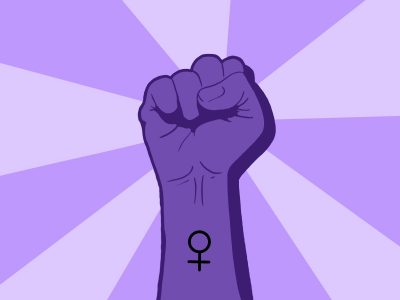My favorite color has been pink since the beginning of time. I wore my pink princess costume everywhere — shamelessly parading the streets of Manhattan, engulfed in a sea of blush pink tulle.
I’ve always had a bubbly personality and traditionally “feminine” interests. The color pink followed me wherever I went. I danced ballet during elementary, middle and high school. I had a very strong passion for makeup and fashion. However, I never thought that my personality and interests would lead me to be perceived as someone who was less serious or intellectually inferior.
Being made fun of by others for my interests led me to question them. I began to shy away from my true self because, clearly, people thought I was the human embodiment of bubblegum, and just as smart.

I wouldn’t consider myself a full-on Elle Woods, but “Legally Blonde” gave me some validation for how I felt. Elle spends her entire first year of law school trying to prove herself due to her stereotypical “bimbo” image and personality. Her valley girl accent, all-pink wardrobe and mannerisms all cause others to undermine her. People question how she got into Harvard Law School, without knowing anything about her accomplishments in the past.
Her experience of being insulted and assumed as intellectually inferior due to the way she presented herself, rings true for many who feel connected to traditionally feminine interests and styles of dress.
I’ve found that no matter how many trends among women change, society will always find a way to shame us for what we like.
For example, the “basic white girl” caricature that appeared around 2014 is still used today. The internet was full of jokes at the expense of girls who liked things such as UGG boots and drinking Starbucks. Then, we saw the “VSCO girl” who likes to wear big t-shirts and messy buns. In 2019, my TikTok feed was inundated with videos making fun of these girls for the way they simply presented themselves. These trends are specifically referring to white women.
Though I speak from my experience as a white woman using stereotypes that apply to me, I am aware of other harmful stereotypes that exist to criticize women of color. The “Hot Cheeto Girl” narrative is used to berate Black and Hispanic women. When you look up #hotcheetogirl on TikTok you can see videos mocking their accents, mannerisms and sense of style. People make these jokes because they have the privilege of doing so without taking racist and sexist implications into account.
Why do people get off on making fun of the interests of teenage girls?
It’s confusing. Even so-called “feminists” who make fun of women who have traditionally feminine interests would join in on the fun. Then, they also get criticized for not fitting into gender norms by men. It’s one big cycle of hating women.
I took a writing class about sex and gender in my first year at Boston University under the wonderful instruction of Professor Zara Amdur. We discussed many ways in which women are put into societal boxes. Feminist theorist Marilyn Frye discussed a “double bind” that women are constantly trapped in. If a woman is sexually active, she’s called a “slut.” If she’s not, she’s a prude and undesirable. There’s only a bad choice and a worse choice for us.
Our “double bind” today is that we either choose to break out of gender norms and get hated for it. Or, we fall into these norms and are immediately assumed as inferior.
If someone told me earlier I would be criticized for the way I looked and acted no matter what, I would’ve just kept being me.
What do we owe the patriarchy, when all it wants to do is keep us subordinate?
I realized others had the same realization about taking control of their femininity for ourselves. TikToker Chrissy Chlapecka has reclaimed the “bimbo” and amassed 5.1 million followers while doing it. In her videos, they sport pink garments and hyper-feminine makeup — promoting sex-positivity and inclusivity.
This new-age idea of hyper-femininity is a powerful asset. It’s something that has allowed me to take back my pink, effervescent lifestyle. I’m flipping off the patriarchy and I’m looking good while doing it.




















































































































